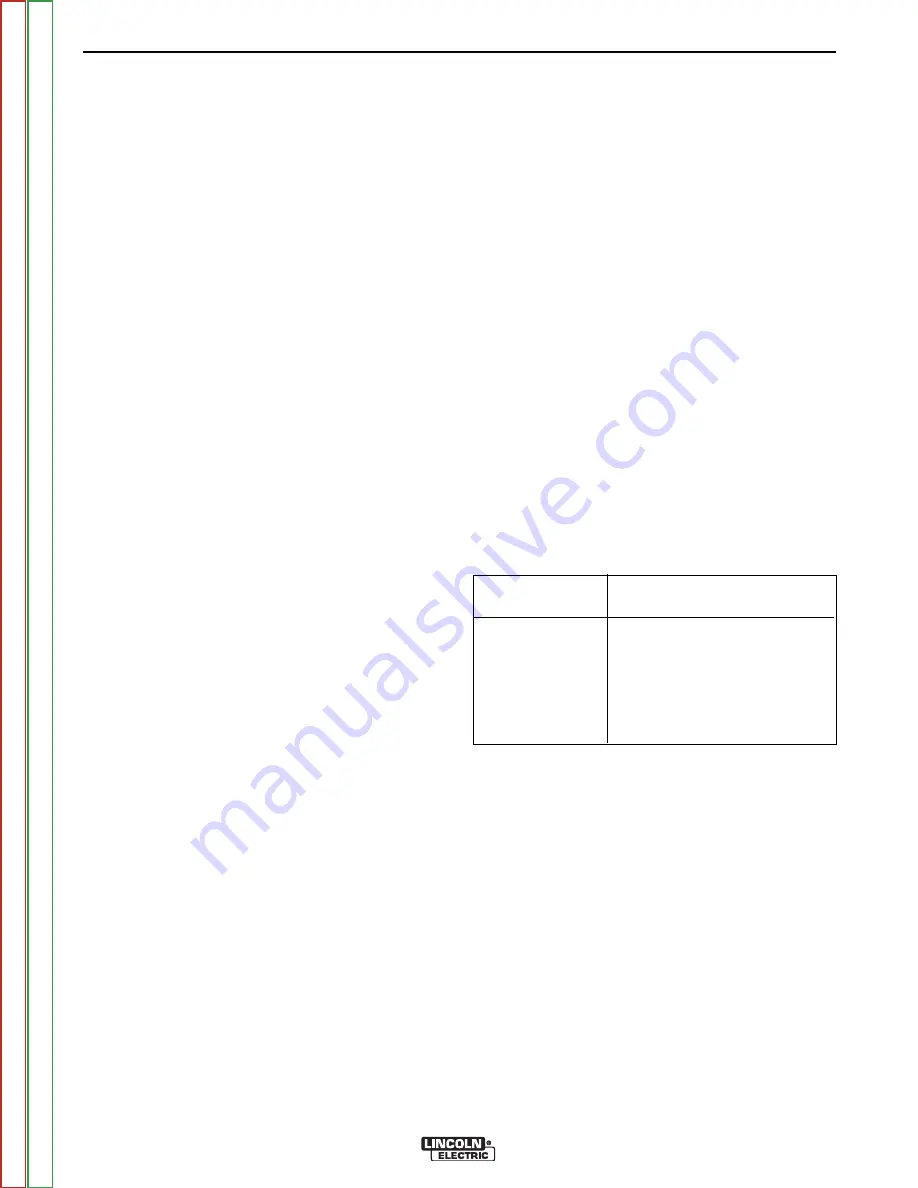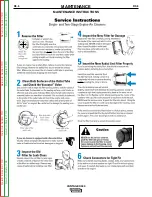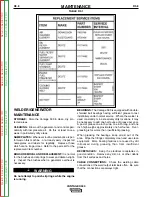
OPERATION
B3.10
B3.10
VANTAGE® 500
WIRE FEED (CONSTANT VOLTAGE)
WELDING
Connect a wire feeder to the Vantage 500 and set
welder controls according to the instructions listed ear-
lier in this section. See the operator’s manual for the
wire feeder or the
“Diagrams
” section of this manual
for connecting instructions of various Lincoln wire feed-
ers.
The Vantage 500 in the CV-WIRE position can be used
with a broad range of flux cored wire (Innershield and
Outershield) electrodes and solid wires for MIG weld-
ing (GMAW). Welding can be finely tuned using the
ARC CONTROL.
Some recommended Innershield electrodes are: NR-
311, NS-3M, NR-207, NR-203 Ni 1%, NR-204-H.
Recommended Outershield electrodes are: 0S-70, 0S-
71M.
Some recommended solid wires for MIG welding are:
.035 (0.9 mm), .045 (1.1 mm) and .052 (1.3 mm), L-50
and L-56, .035 (0.9 mm) and .045 (1.1 mm) Blue Max
MIG 308 LS.
For any electrodes, including the above recommenda-
tions, the procedures should be kept within the rating of
the machine. For additional electrode information, see
Lincoln publications N-675, GS-100 and GS-210.
AUXILIARY POWER OPERATION
Start the engine and set the IDLER control switch to
the desired operating mode. Full power is available
regardless of the welding control settings, if no welding
current is being drawn.
The auxiliary power of the Vantage consists of two 20
Amp-120VAC (5-20R) duplex receptacles and one 50
Amp-120/240 VAC (14-50R) receptacle. The
120/240VAC receptacle can be split for single phase
120 VAC operation.
The auxiliary power capacity is 12,000 watts of 60 Hz,
single phase power. The auxiliary power capacity rating
in watts is equivalent to volt-amperes at unity power
factor. The maximum permissible current of the 240
VAC output is 50 A. The 240 VAC output can be split to
provide two separate 120 VAC outputs with a maxi-
mum permissible current of 50 A per output to two sep-
arate 120 VAC branch circuits. Output voltage is within
± 10% at all loads up to rated capacity.
NOTE:
The 120/240V receptacle has two 120V out-
puts of different phases and cannot be paral-
leled.
The auxiliary power receptacles should only be used
with three-wire grounded type plugs or approved dou-
ble insulated tools with two wire plugs.
The current rating of any plug used with the system
must be at least equal to the current capacity of the
associated receptacle.
SIMULTANEOUS WELDING AND
AUXILIARY POWER LOADS
It must be noted that the above auxiliary power ratings
are with no welding load. Simultaneous welding and
power loads are specified in
Table B3.3 or B3.4.
The
permissible currents shown assume that current is
being drawn from either the 120 VAC or 240 VAC sup-
ply (not both at the same time).
ARC GOUGING
For optimal performance when arc gouging, set the
Vantage 500 WELD MODE switch to the CC - STICK
position, and the ARC CONTROL to 10.
Set the OUTPUT knob to adjust output current to the
desired level for the gouging electrode being used
according to the ratings in the following table:
Electrode
Current Range
Diameter
(DC, electrode positive)
1/8”
30-60 Amps
5/32”
90-150 Amps
3/16”
150-200 Amps
1/4”
200-400 Amps
5/16”
250-400 Amps
3/8”
350-575 Amps*
* Maximum current setting is limited to the Vantage 500
maximum of 575 Amps.
PARALLELING
When paralleling machines in order to combine their
outputs, all units must be operated in the CC - STICK
mode only. To achieve this, turn the WELD MODE
switch to the CC - STICK position. Operation in other
modes may produce erratic outputs and large output
imbalances between the units.
Return
to
Section
T
OC
Return
to
Section
T
OC
Return
to
Section
T
OC
Return
to
Section
T
OC
Return
to
Master
T
OC
Return
to
Master
T
OC
Return
to
Master
T
OC
Return
to
Master
T
OC
















































